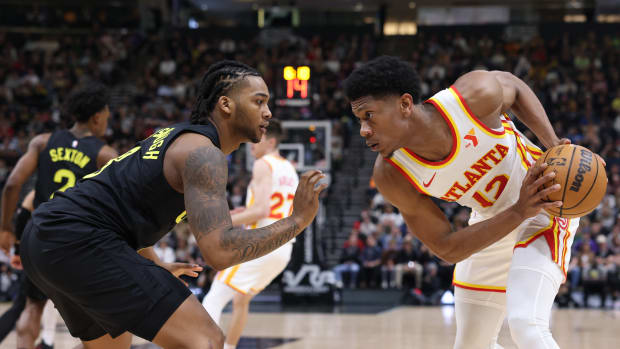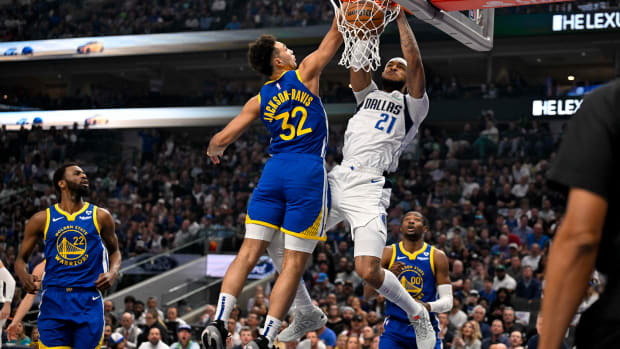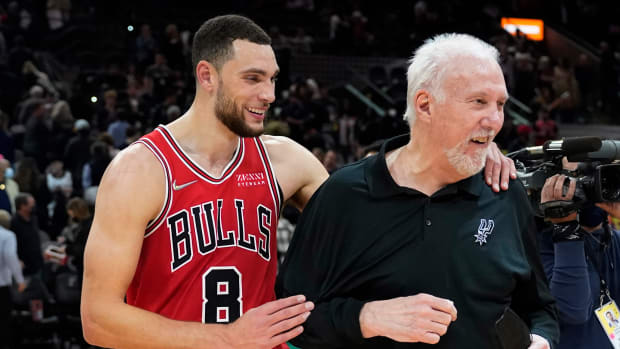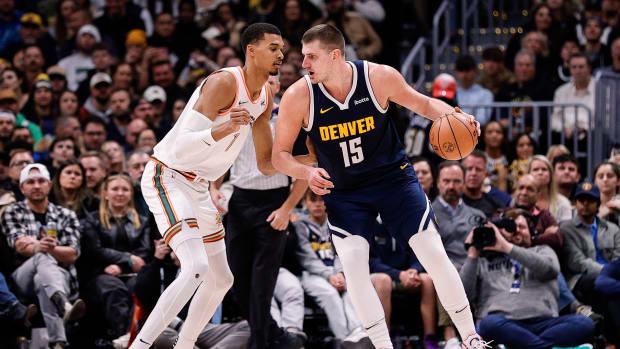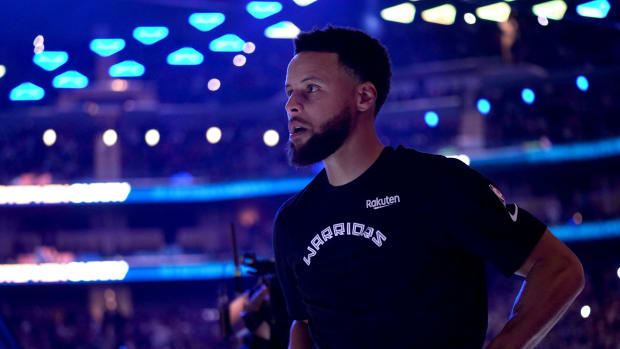Can Pelicans GM Danny Ferry Change NBA's Mind on Resting Anthony Davis?
Could the NBA have a change of heart on whether the New Orleans Pelicans must play Anthony Davis over the remaining 23 games in the 2018-19 regular seasons?
According to a report by Marc Stein of The New York Times, Pelicans acting general manager Danny Ferry hopes to find out. Stein reveals that Ferry, who took over for the recently fired Dell Demps, intends to “re-engage” the NBA on its threat to invoke its anti-resting policy should the Pelicans rest Davis.
The economic logic of NBA’s anti-resting policy
Under the anti-resting policy, NBA commissioner Adam Silver has the discretion to fine a team “at least $100,000” for resting a healthy player. The imposition of the penalty is more likely to occur in response to teams that sit players in nationally-televised games and when the rested players are stars.
Part of the anti-resting policy’s underlying rationale is that sitting healthy stars damages the league’s financial interests as well as those of competing teams.
Fans, after all, are more likely to pay for tickets to attend games that feature stars, just as they are more likely to watch star-filled games on TV. Similarly, fans are more likely to become paying consumers of NBA apparel, merchandise and video games when the league product is linked to the league’s best players.
If fans are instead treated to the “B Team” or players who are only a notch or two about those in the G League, those fans might become less interested in their team and, in turn, less interested in the NBA and its accompanying products and services. Worse yet from the NBA’s perspective, disinterested fans could gradually migrate their finite time and limited dollars away from the NBA and towards some other retailer of entertainment.
This needn’t be abstract. Take the Phoenix Suns. With a dreadful 11-48 record, the Suns have the worst record in the NBA. They are truly a team that is playing out the string. The Suns are nonetheless in a far better position to advertise, and sell tickets to, their upcoming home game on March 1 against the Pelicans if fans know that Davis will play in that game. Davis is a draw. He is one of the league’s best players. The controversy currently surrounding him might even make him more of a draw. But if Suns fans learn that Davis will be a healthy scratch in that March 1 game, it will prove more challenging for Suns sales staff to convince their fans to pay good money to watch a 26-33 team led by Jrue Holiday and Julius Randle live than if those fans knew Davis would play. Similarly, if fans with tickets don’t show up to a Suns game because it unappealingly lacks one of the NBA’s true superstars, the Suns will experience diminished concession and parking revenue.
The NBA has also observed consumer protection litigation over “star-less” lineups. Seven years ago, the San Antonio Spurs were sued after coach Gregg Popovich sent most of his starting lineup home to San Antonio instead of playing in the last game of a road trip in Miami. In McGuinness v. Spurs, a Heat season ticket holder argued that the Spurs had engaged in an illegal bait-and-switch by advertising Tim Duncan, Tony Parker, Manu Ginobili and other Spurs starters only to rest them. The lawsuit failed because an NBA ticket only guarantees that specific teams will play, not that specific players on those teams will play. Still, Popovich’s resting aggravated then-NBA commissioner David Stern, who felt that the practice betrayed the interests of fans and the league’s broadcast partners. Stern fined the Spurs $250,000.
The relationship between star resting and tanking
The anti-resting policy is closely connected to the league’s anti-tanking policy. Article 13(g) of the league’s constitution forbids teams from “attempting to lose” a game. As I detailed in a previous story on Davis and sitting, the NBA has a long history of powerlessly watching non-playoff teams tank in hopes of landing superior odds in the draft lottery. A team that tries to lose is, of course, engaged in a form of anti-competitive cheating: while other bad teams play competitively and win a few games even if doing so hurts their draft odds, a tanking team “games” the system to raise the probability of losing and thus increase their draft odds.
If Davis sits the remainder of the ’18-’19 season, the Pelicans, which currently have the eighth worst record in the league, would likely lose more games than if he plays. The numbers bear this out. Davis has missed 14 games thus far in the 2018-19 season. Those missed games are largely accountable to Davis suffering a left index finger fracture. The Pelicans went 4-10 in that stretch, meaning they had a decidedly worse winning percentage without Davis (.289) than with him (.489). Stein notes that the Pelicans played “scrappier ball without Davis.” Still, it would be very difficult for Ferry to persuasively argue that removing one of the best players in the NBA from the Pelicans roster would somehow make them more competitive down the stretch. The Pelicans have already shown they lose more often without Davis than with him. A Davis-less Pelicans are also a far less marketable draw for retailers of NBA tickets and broadcasters of NBA games than a Pelicans team with their 25-year-old superstar.
The Pelicans-Lakers drama could play a part
The Pelicans, Stein suggests, might also point out to the league that two of their upcoming games are against the Los Angeles Lakers. The teams will play in New Orleans on Saturday and in Los Angeles next Wednesday. The Davis situation might prove more of distraction in those games than in others.
As detailed previously on The Crossover, the NBA is investigating whether the Lakers, and possibly LeBron James through his (and Davis’s) agent, Rich Paul, have conspired to tamper. The supposed plot involves the conspirators trying to persuade Davis to force his exit out the Pelicans and to the Lakers. To the extent there is or was any plot, it has thus far bombed. The Lakers failed to trade for Davis prior to the trading deadline and, if we take Davis at his word, he is now open to being traded to other teams this summer.
I expect the NBA to be less inclined to allow the Pelicans to sit Davis against the Lakers than against any other team. The league knows that national interest in those Pelicans-Lakers would be much higher with Davis in them than without him. TV ratings would rise accordingly: drama sells, and a matchup between a 28-29 team and a 26-33 team would be a lot more compelling if Davis—the coveted one—plays in that game than if he sits.
J.R. Smith and Chandler Parsons aren’t Anthony Davis
The Pelicans could also point to the NBA that other teams have sat healthy players without suffering any penalty for it. During the current season, the Cleveland Cavaliers have sat a healthy J.R. Smith and the Memphis Grizzlies have sat a healthy Chandler Parsons.
The defect with that argument for the Pelicans is that, at this point in their careers, neither the 33-year-old Smith nor the 30-year-old Parsons qualifies as a star. They are merely role players whose absences likely didn’t impact Cavaliers and Grizzlies games very much. Moreover, neither player is a significant marketing draw to fans to attend games or to watch those games on TV. In other words, comparing the Pelicans sitting Davis and other teams sitting bench players is an “apples and oranges” comparison and one that is unlikely to persuade the NBA.
The Pelicans could disobey the NBA. But what would come next?
Some have urged the Pelicans to disregard the NBA’s warning and simply sit Davis for the remaining 23 games. The team would then face a minimum $2.3 million fine. In return, the Pelicans would protect the health of the franchise player who they will almost certainly deal in a blockbuster summer trade. The Pelicans would also lose more games and improve their odds at landing one of the draft’s top picks, whether that pick proves to be Zion Williamson, R.J. Barrett or one of the other young phenoms. The $2.3 million fine, then, could be looked at as a worthwhile payment and a de facto insurance policy for Davis’s health. It could also be judged by Pelicans officials as a sensible expense to improve, albeit slightly, the Pelicans’ odds in the lottery.
The problem with that logic is that it ignores how the NBA would respond to a team openly defying it. What the Pelicans do would not happen in a vacuum. The league would respond in kind.
First, the league’s anti-resting policy calls for a minimum $100,000 fine. It’s possible the league could substantially increase the fine if it believes that the Pelicans are not adequately deterred by the $100,000 figure.
Second, the league could invoke the “best interests of the Association” power found under Article 24 of the league constitution. Through Article 24, Silver has discretion to impose a penalty of his choosing for conduct that harms the league in ways that go beyond stated rules. A team rebelliously sitting a star player against the wishes of the commissioner could harm the league in several ways. For instance, it could undermine the commissioner’s authority. It could also make the team and, by extension, the league less marketable and less competitive. Those outcomes could be construed as violating the league’s best interests.
Silver could then affix a series of punishments against the Pelicans. They include a suspension of Pelicans officials, massive fines and draft pick forfeiture. Any such actions by the commissioner would be “final, binding, conclusive, and unappealable.”
Third, the league could rely on Article 13’s anti-tanking language. Article 13 contemplates the grounds for removing of an owner from the league. While it’s unlikely that the NBA would seek to remove Gayle Benson as Pelicans owner over the team sitting Davis, the fact that the league could construe such resting as grounds for owner expulsion highlights the extent of league power in the constitution.
Fourth, Silver could turn to Article 35A, which allows him to suspend or fine up to $1 million a coach or GM who is “guilty of conduct prejudicial or detrimental to the Association.” A GM and coach who dare the NBA into punishing their team could set a negative precedent for the commissioner’s ability to control the league. That, in turn, could persuade Silver to take decisive action against both Ferry and head coach Alvin Gentry.
Also, before you think the Pelicans could play Davis for two minutes and then bench him, the NBA would almost certainly interpret that type of “gimmick” approach as a violation of the spirit of the anti-resting policy, if not the letter of it.
The Players’ Association could object to Pelicans sitting Davis
If the Pelicans sit Davis against his wishes, there would be, as I outline in another The Crossover piece, grounds for both Davis and the National Basketball Players’ Association to object.
Davis could argue the benching hurts his career statistics in that he will accumulate fewer career blocked shots, points, rebounds and other stats if he is jettisoned from the team. He would also miss games that he could never get back.
Further, Davis could contend that he would suffer reputational harm. He might be judged (unfairly) as lacking fire or competitive spirit if he allows a team to bench him. Such reputational harm could damage his endorsement opportunities. Also, though Davis publicly demanded a trade—an act for which he was punished $50,000 by the NBA—he never said he would not honor his contract. To the extent Davis broke a team rule, the punishment for it has already been levied by the NBA. This is an important point because under the “one penalty” provision in Article VI of the collective bargaining agreement, players can’t be double punished by the league and team for the same misconduct.
The NBPA would also be worried about the Pelicans setting injurious precedent for players. If the Pelicans can bench a star player merely to protect his health as an asset, other teams could adopt the same script in the future. In response, the NBPA could file a grievance under Article XXVI. This section of the CBA governs application of team rules. The NBPA would assert that Davis’s benching is tantamount to an unauthorized administrative suspension where he is paid but kept away.
Michael McCann is SI’s legal analyst. He is also Associate Dean of the University of New Hampshire School of Law and editor and co-author of The Oxford Handbook of American Sports Law and Court Justice: The Inside Story of My Battle Against the NCAA.































